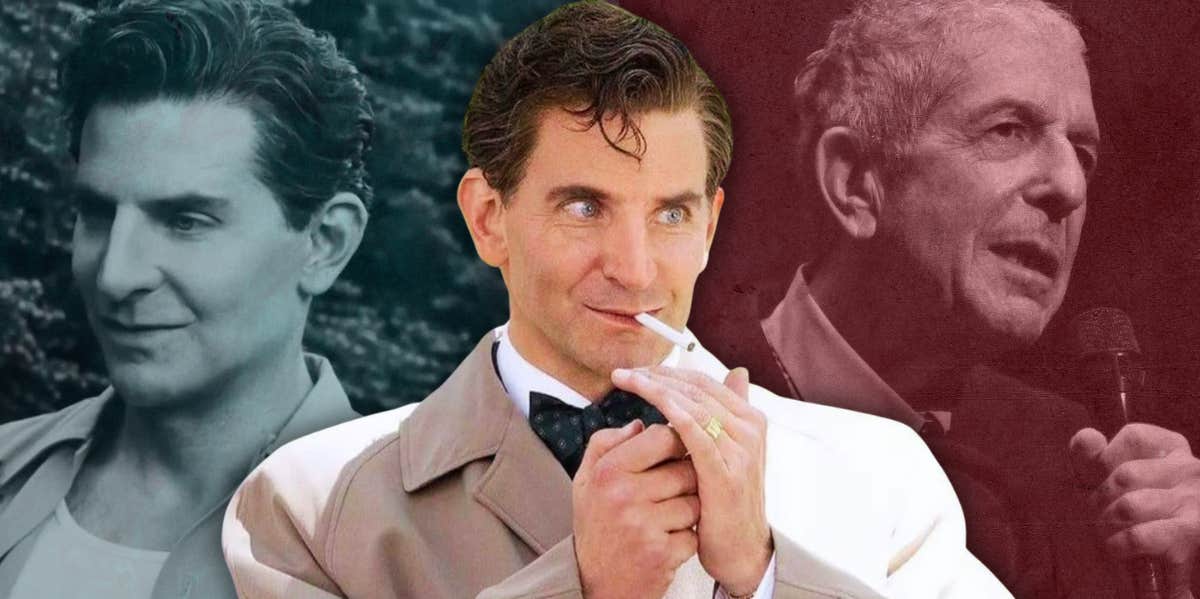Bradley Cooper Receiving Backlash For His Prosthetic Nose In 'Maestro' Detracts From The Celebration Of Bernstein's Identity
Bernstein should be remembered for his talent, tenacity, and very Jewish tendency to survive and thrive in hardship, not just his nose.
 Netflix; Rama, CC BY-SA 2.0 FR / Wikimedia Commons
Netflix; Rama, CC BY-SA 2.0 FR / Wikimedia Commons The movie “Maestro,” featuring Bradley Cooper as famed composer Leonard Bernstein, is set to premiere at the Venice Film Festival between August 30 and September 9, 2023.
As the release date approaches, a conversation surrounding Cooper’s casting as Bernstein has been revived in the public discourse. Fans are discussing their conflicting perspectives on one particular aspect of Cooper’s character — his prosthetic nose.
The backlash against Bradley Cooper for wearing a prosthetic nose in ‘Maestro’ detracts from the core message of the Leonard Bernstein biopic.
Photographs of Cooper as Bernstein have been making their rounds online, revealing that the star actor, writer, and director of “Maestro” made a very pointed choice for his portrayal of the famous composer. To play Bernstein, Cooper wore an exaggerated, oversized fake nose. The nose can only fully be described using my own Jewish grandparents' native Yiddish: It is the true definition of a schnoz.
Jokes aside, Cooper’s decision to wear a fake nose raised many Jewish people’s defenses and reignited a crucial, cyclical conversation.
Is it okay for actors from non-marginalized communities to play marginalized characters?
One person on Twitter raised what seemed to be a valid practical concern about Cooper’s choice to wear a large fake nose to play a Jewish character. Sarah McGonagall tweeted, “This feels especially sinister because Bradley Cooper’s nose is already the same shape and size, if not slightly larger, than Leonard Bernstein’s was.”
In determining that Cooper’s fake nose is “sinister,” she’s calling it out as a harmful perpetuation of a deeply-rooted stereotype about Jews while acknowledging that this particular representation of Bernstein comes at a time when anti-Semitism and white nationalism are on the rise.
Someone else on Twitter utilized the very Jewish technique of employing humor as an entry point to discussing social issues. As Rach tweeted, “Sorry to keep harping on this but do you understand HOW bad your makeup choices have to be to make everyone universally mad at an Italian guy playing a Jewish guy? For generations, we’ve played each other in harmony.”
Rach continued in a second tweet, “Like this is so wild I haven’t even seen anyone accuse the movie of erasing his queerness yet, THAT’S how absurd this prosthetic nose is.”
The negative reaction that the fake nose received prompted Bernstein’s children, who are the executors of his estate, to speak out in defense of Cooper. In a statement made to Instagram, Jamie, Alexander, and Nina Bernstein announced their abiding support for how their father was portrayed on screen.
They explained that Cooper included them in “every step of his amazing journey,” and praised “the depth of his commitment, his loving embrace of our father's music, and the sheer open-hearted joy he brought to his exploration.”
In offering their support to Cooper’s representation of their father, Bernstein’s children both acknowledge and celebrate the composer’s innate Jewishness.
“It happens to be true that Leonard Bernstein had a nice, big nose,” they stated. “Bradley chose to use makeup to amplify his resemblance, and we're perfectly fine with that. We're also certain that our dad would have been fine with it as well.”
The Bernsteins commented that the heightened level of discourse around Cooper’s prosthetic nose actively took away from the conversation that should be engaged in— most notably, the significance of Bernstein’s artistic achievements and cultural contributions to America.
They wrote, “Any strident complaints around this issue strike us above all as disingenuous attempts to bring a successful person down a notch — a practice we observed all too often perpetrated on our own father.”
Bernstein’s success in the American art world came at a time when being Jewish was openly stigmatized, even dangerous. He accessed spaces that weren’t at all designated to be inclusive: He graduated from Harvard. He spent 40 years as the conductor of the New York Philharmonic Orchestra.
Bernstein showcased not only his talent but also his tenacity, along with the very Jewish tendency to survive and thrive when faced with extreme hardship. His story is one that should absolutely be told, as it’s one that captures the power of love, family, and creativity as a triumph.
Ultimately, what matters is that Bernstein’s children stand by Cooper’s representation of their father, as they are the ones to carry his legacy. Yet the force of the conversation being had around who has the right to represent whom in works of fiction highlights the inherent complexity of the issues at play.
Alexandra Blogier is a writer on YourTango's news and entertainment team. She covers celebrity gossip, pop culture analysis and all things to do with the entertainment industry.
